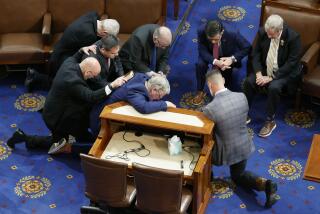Smooth Sailing in Senate So Far for GSA Nominee Johnson : Government: O.C. businessman, Clinton’s choice to head federal housekeeping agency, gets mostly friendly questioning at hearing. He outlines plans for a shake-up.
- Share via
WASHINGTON — Roger W. Johnson, the Orange County businessman who broke ranks with the Republican Party to endorse Bill Clinton’s presidential bid, sailed through a Senate confirmation hearing Tuesday as he outlined his plans to shake up the federal government’s vast housekeeping agency, the General Services Administration.
After two hours of largely friendly questioning by members of the Senate Committee on Governmental Affairs, Sen. John Glenn (D-Ohio), who chairs the panel, predicted that Johnson’s nomination would go to the full Senate as early as next week.
During the hearing, Johnson vowed to remake the GSA into an agency that is at once more efficient, less centralized, and more trusting of its own employees and the businesses with which it deals.
“I believe that people are fundamentally honest,” the 58-year-old Johnson told the committee members. The government’s tendency to assume that both its vendors and its employees are out to steal and cheat “results not only in . . . excessive costs and time delays, but . . . stifles creativity and reasonable risk-taking, and makes form more important than substance,” Johnson said.
Johnson has been president and chief executive officer of Irvine-based Western Digital Corp., which sells computer products, since 1982. The Fortune 500 company grew from 811 to 7,600 employees under Johnson’s tenure.
Johnson and fellow Orange County Republican Kathryn Thompson shocked their political associates in December, 1991, when they hosted a breakfast for then Democratic presidential candidate Bill Clinton in Newport Beach. Johnson said at the time that he was impressed by Clinton’s plans for revitalizing the national economy. Clinton nominated Johnson to head the GSA on March 29.
The GSA is responsible for building and maintaining government buildings and for purchasing virtually all non-military supplies used by the government, from trucks to toilet paper.
Responding to questions, Johnson vowed on Tuesday to scrutinize the cost of constructing new federal buildings, including courthouses, assemble an inter-agency group to recommend the most efficient use of abandoned federal facilities, including military bases, and improve the way the government purchases data processing and other services.
He paid particular attention to the courthouse issue, noting that the cost of building federal judicial facilities appears dramatically higher than the price tag for federal office buildings, as well as private, commercial structures.
Johnson suggested that he might support a moratorium on construction of new courthouses, while the GSA investigates the issue. However, he said the matter requires further study.
Halting courthouse construction conceivably could affect plans to build a new federal judicial complex and office building in Santa Ana. Rep. Christopher Cox (R-Newport Beach), who introduced Johnson to the Senate Committee, has asked Congress to appropriate $168 million to build the new, 300,000-square-foot facility. A House appropriations subcommittee has set aside $151 million for the project.
The toughest question for Johnson came from Sen. Jim Sasser (D-Tenn.), who asked if the business executive’s ties to the Republican Party would prevent him from ousting poorly performing GSA officials appointed by former Presidents Ronald Reagan and George Bush.
“I will take whatever action I need to take to move issues forward,” Johnson replied. “The test is issues, the test is logic, the test is performance.”
Under questioning by Glenn, Johnson backed off a position he took when interviewed for an article published in the March 30 edition of the Los Angeles Times. At the time, Johnson told The Times that he would consider significantly reducing the size of the 20,000-person agency. Johnson was again quoted expressing that view when a more extensive version of the interview was published in The Times on April 4.
“I don’t go into any organization where I don’t think it’s too big. I think we can do some more cutting here,” Johnson said in the April 4 article. “I’m sure there are enough people that we can do it without too much pain, through attrition.”
But during Tuesday’s hearing, Johnson said of the March 30 article: “I don’t know where that quote came from. That is not an end objective.”
“That was not an accurate statement of your views then?” Glenn asked. Johnson replied, “No.”
Although Johnson had been twice quoted as saying the same thing, he had not disavowed the quote before Tuesday’s hearing. Times Orange County Editor Martin Baron said the newspaper stood by the accuracy of the newspaper’s reporting.
After the questions ended, Johnson’s wife, Janice, expressed relief and marveled at the amount of documentation required during the confirmation process. “He must have submitted 60 pounds of paper, by the time he was finished, between the IRS, the FBI and the White House,” she said.
Included in those papers was the disclosure that Western Digital last December agreed to a severance package for Johnson worth at least $1.8 million. In a financial statement filed with the Senate committee, Johnson said Western Digital will pay him up to two years’ salary, at $500,000 a year, as well as a special bonus of $500,000 upon his resignation.
The company also agreed to forgive a $335,000, no-interest loan, and will permit Johnson to exercise options to purchase nearly 194,000 shares of company stock, he stated. Western Digital stock closed Tuesday at $4.50 a share.
More to Read
Get the L.A. Times Politics newsletter
Deeply reported insights into legislation, politics and policy from Sacramento, Washington and beyond. In your inbox twice per week.
You may occasionally receive promotional content from the Los Angeles Times.










